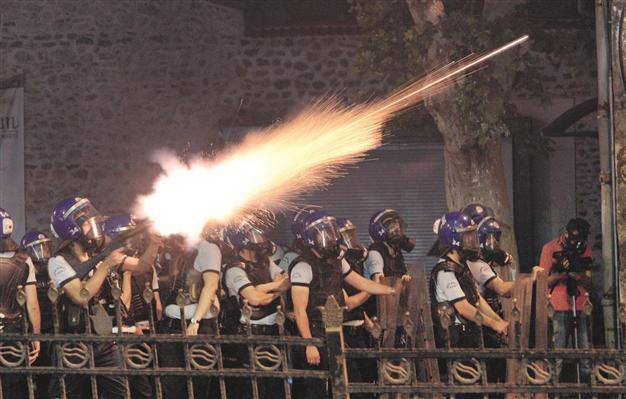Turkey's police power needs to be limited, says report
ISTANBUL

Police fire tear gas at the protesters in Istanbul’s Beşiktaş district during Gezi Park demonstrations in this file photo takne in June 2013. DAILY NEWS photo
Turkey needs to review police laws after heavy-handed crackdowns on protests in 2013, according to a report from the Turkish Economic and Social Studies Foundation (TESEV) Democratization Program.The report titled “The Spirit of the Police Laws in Turkey: Legislative Discourses, Instruments and Mentality” reviewed Turkey’s police laws, security policies and their relations to individual rights.
“Turkey’s democratization efforts can become meaningful only if they are based on protection and prioritization of individual rights and liberties,” the report said. “In this context, the fact that, even today, the concept of ‘state security’ is widely used, indicates that there is a serious problem concerning democratic principles and fundamental rights and freedoms in Turkey.”
The report said the relationship between policing, society and politics is becoming a more prominent debate in Turkey’s public agenda, citing the controversial riot control methods by police in May Day celebrations, the Gezi Park resistance and protests at Middle East Technical University (ODTÜ), as well as in Diyarbakır and Yüksekova.
It also referred to EU reports, noting that a report written by the Council of Europe commissioner for human rights, based on a visit to Turkey in July 2013, highlighted the problem of impunity of ill treatment and the use of excessive force by police officers. The European Commission 2013 Progress Report on Turkey also emphasized that necessary steps should be urgently taken to establish an independent Law Enforcement Monitoring Commission in order to oversee violations committed by police officers.
“The current affairs not only remind us of the delicate position of the police force in the society, state and government dynamics, but also show that concrete and lasting measures for police reform in Turkey need to be put in effect,” the report said.
The report followed a brief evolution of police laws in the country, notably the Law on Police Duties and Entitlements (PVSK) and Laws on Criminal Procedure, and said the current versions of the two were largely shaped by the way Turkey tried to handle the Kurdish issue.
“The period following the 1980 coup was accompanied by the first steps taken to transition to a market economy that promoted precarious work, large-scale suppression and repression of civil society organizations, unions and societal opposition, as well as the intensification of the armed conflict in the Kurdish regions of Turkey,” the report said. “This new period also included the increase in police powers and authorities through legal amendments, the expansion of the police force’s scope of authority, and the strengthening of its capacity.”
It added that during that era the riot police unit was formed to intervene against meetings and demonstrations.
“The practice of ‘state of emergency’ policing for which the foundations were laid in the 1980s, especially in the context of the armed struggle between the PKK [Kurdistan Workers’ Party] and the Turkish Armed Forces, became formalized with the enactment of the ‘Anti-Terror Law’ in 1991. The ‘Anti-Terror Law’ was enacted primarily to ensure the security of the state against ‘threats of terrorism,’ and it is significant for its important limitations of individual rights and liberties,” the report said.
The report concluded on an optimistic note, citing some positive developments on the issue. “Recent changes targeting the rights of the accused and the judicial reform packages on the Anti-Terror Law (TMK) are reasons for hope,” the report said. “It can still be said, however, that these changes are short-term revisions rather than reform, and thus inadequate.”
















